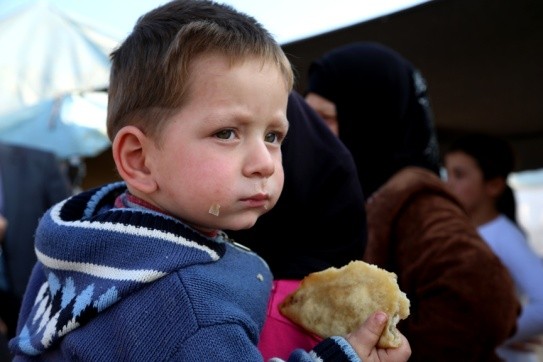
In mid-2011, a violent crackdown on anti-government protestors exploded into a large-scale conflict in Syria, forcing millions to flee. As Syria’s largest neighbor, Turkey opened its 511-mile border to over 500,000 Syrians seeking refuge from violence at home.
Maintaining an open border policy with its southern neighbor, Turkey provides housing and relief services to hundreds of thousands of refugees living in 21 camps across 10 provinces as well as in urban areas.
Prior to the conflict, Syria was a middle-income country on par with many of its Mediterranean neighbors. Although the Syrian economy relied heavily on agriculture, the majority of the population lived in urban areas and shopped at grocery stores. When the crisis began, much of the country’s infrastructure began to unravel, including large-scale food production and distribution networks. Syrians reported that some foods, such as fresh produce, meat and dairy could scarcely be found in markets. As the crisis escalated, so did the number of refugees fleeing to Turkey.
The Turkish Red Crescent Society, locally known as Kizilay, has been the leading organization responding to the Syrian refugee crisis in Turkey. When the refugees first arrived, Kizilay cooked hot meals for thousands of Syrians each day. Recognizing it could no longer meet the basic food needs for the hundreds of thousands of people pouring across the Turkey-Syria border, the Government of Turkey requested additional food assistance and funding from the U.N. World Food Program (WFP).
In October 2012, WFP, with support from donor organizations including USAID, partnered with Kizilay to implement a card-based aid delivery system. Through these electronic cards, WFP and Kilizay began providing refugees in camps with a monthly cash credit to buy their own food in local supermarkets.
The program is good for the local economy, significantly reduces the cost of feeding refugees, and allows families in camps to regain a sense of normalcy by buying and cooking the foods they eat at home. The program also takes full advantage of Turkey’s well-established financial infrastructure and allows WFP to closely monitor assistance by tracking food prices, spending patterns and inventory levels in stores.
Nearly one and a half years later, USAID is now the largest donor of WFP’s emergency operation in Turkey, having contributed $29 million. WFP and Kizilay together distribute food cards to over 140,000 refugees in 15 camps across Turkey.
"We used to receive hot meals from camp administration. It was enough to survive, but the foods were unfamiliar," said Nour*, a 43-year-old living in Turkey’s Osmaniyah camp. "With the electronic food cards, our lives are 100 times better. We can now buy and cook exactly what our family needs."
Originally from a coastal city in Syria, Nour came to Turkey in late 2011 with the clothes on her back and five children—four daughters and a son. Her husband had been arrested by government forces and, fearing for her children’s safety, she fled north. When Nour first arrived in Turkey, she was thankful for the newfound security, but hated the feeling of helplessness as she and her children queued for hot meals three times daily.
With a smile, Nour says that since the transition to electronic food cards, she has been able to cook the meals her children are most familiar with, creating a sense of normalcy and making their tent feel more like a home. When asked if her daughters help with the cooking, Nour laughed and shook her head vigorously. “Never!” she said, “But my son does,” pointing to the door of the tent. Her 15-year-old son was sitting inside shelling peanuts, the local specialty of Osmaniye province.
*Name changed to protect identity.







Comment
Make a general inquiry or suggest an improvement.